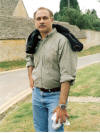|
|
the-south-asian.com July / August 2006 |
|
|||
|
August/September Contents
Sufis - wisdom against 50
years of mountain Heritage cities:
Cotton - the fibre of
|
|
||||
|
Page
1 of 6 Security and Trust in Internet Banking by Salman Minhas
First published November
2001
It took the world about 2,000 years to evolve and establish trusted institutions and mediums of exchange . Trade evolved from barter [ spices in 1599 were worth more than their weight in gold ] into Silver & Gold Coins [ Francis Drake’s booty from the Spanish Armada is worth about 1 million Pounds Sterling and Keynes describes it as the origin of British Foreign Investment] . Paper currency was tried in ancient China [ 1448 - Ming notes ] & Europe ; Italian Genoese bankers coined the word " bankrupt" from the Italian "Banca Rotta" [ rotten bench] - Italian merchants were given benches at the port city of Genoa and if the merchant did not honor financial commitments his bench used to be broken up. Letter of Credit and Guarantee, Bills of Exchange and the pooling of resources leads to the joint stock company concept to reduce trade-risk. Somewhere in 1494, an Italian Friar writes the first book on what is today standard double-entry accounting /book keeping. More recently the Gold Standard was replaced by the Dollar Standard ; currently VISA, Amex, MASTER cards are standard. Trust evolved historically through checks/controls & processes followed by Banking institutions. The Internet offers the potential to increase Global Trade by a factor of at least 10 times. Before that can be achieved, a secure digital transaction security system [the PKI - Public Key Infrastructure model ] is necessary for the Internet advantages to be exploited . The South Asian Countries lack a rigorous Legal & Banking Security Infrastructure to implement PKI. What follows is an essay on the potential the Internet provides to Banking and the related security technology problems of the issue of Trust in Internet based banking. Encryption Technology issues are also briefly appended at the end. Companies & Government institutions using current digital security "PKI" systems are given.
"For Whom the Phone Rings……….." Driven by the need to maximize profit margins [ already slimming worldwide over the last 20 years - Banking is a heavily over-saturated industry ] , the Banking industry has always used Information Technology for its maximum benefit. When John Reed introduced Automated Teller Machines [ATMs] in the 1970’s, unhappy New York city consumers, at not getting human teller service , called it a "shittybank" . Today however Citibank’s decision is vindicated but it took about 10- 15 years to become part of everyday life in the West & the Middle East at gas stations and streets, airports and supermarkets 24 hours, 365 days non-stop, Thus the Citibank ad in 1980’s : "The CITI never sleeps............"
Electronic Money Transfers: By using IT and Data Networks, -- Banks capital flows are tapped from remote branches to the HQ, -- the velocity of money is accelerated, -- the overall Capital Float available to the Treasurer at the end of day & hence to customers increases. In Japan, consumers can deposit end of day change back into ATM’s at night. Japan has one of the highest savings rate in the world [25-40 %]. In the Foreign Exchange market about $ 1.5 trillion dollars is traded globally via the Electronic networks of Banks. Other areas that benefit from data networks are Cash Management to invest and maximize their inter-bank transactions [ in Bonds & Money Market & Foreign Exchange, Swaps , Derivatives, etc ]. A new faster way of settling/ clearing transactions is called ‘Straight Thru Processing’ [ STP] where the transaction always gets settled into the corresponding Credit / Debit or Our /Their – "Lori / Nostri " Bank accounts . Accounts are consolidated with these global & regional cash flows at the Central & Regional Level Headquarters in their various countries in USA, Europe and Japan.
|
|||||
|
Copyright © 2000 - 2006 [the-south-asian.com]. Intellectual Property. All rights reserved. |
|||||
